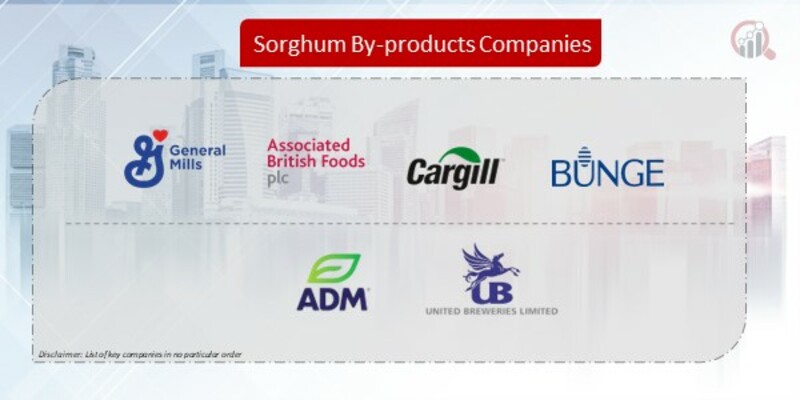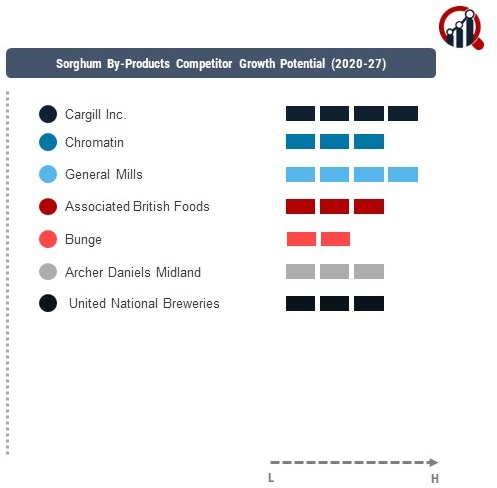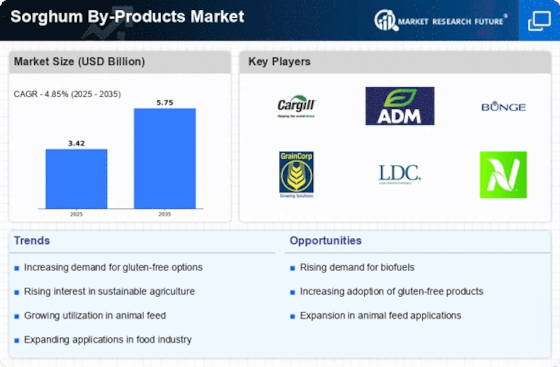Top Industry Leaders in the Sorghum Products Market

The sorghum by-products market is a significant segment within the agricultural and food industries, providing diverse applications in both human and animal nutrition. Key players in this market strategically position themselves to address the increasing demand for sustainable and nutritious by-products derived from sorghum. This analysis provides an overview of the competitive landscape, covering key players, strategies, market share factors, emerging companies, industry news, current investment trends, and a notable development in 2023.
Key Players:
Cargill Inc. (U.S.)
Chromatin (U.S.)
General Mills (U.S.)
Associated British Foods (U.K)
Bunge (U.S.)
Archer Daniels Midland (U.S.)
United National Breweries (South Africa)
Strategies Adopted:
The sorghum by-products market adopt various strategies to maintain and enhance their market positions. Strategies include vertical integration, sustainability initiatives, and product diversification. For example, Archer Daniels Midland Company (ADM) has been investing in sustainable sorghum sourcing, ensuring responsible agricultural practices and promoting environmental stewardship. Such strategies not only contribute to meeting consumer demands for transparency and sustainability but also help companies differentiate themselves in a competitive market.
Market Share Analysis:
The sorghum by-products market involves evaluating multiple factors impacting competitive positioning. Key considerations include the quality and consistency of sorghum by-products, supply chain efficiency, brand recognition, pricing strategies, and the ability to cater to diverse industries such as food, feed, and industrial applications. Companies that effectively balance these factors are better positioned to capture and retain a significant share of the market. Additionally, factors such as compliance with industry regulations, effective marketing strategies, and responsiveness to emerging market trends contribute to market differentiation and influence consumer choices.
News & Emerging Companies:
The sorghum by-products market has witnessed the emergence of new and innovative companies, reflecting the industry's adaptability and potential for growth. In 2023, emerging players like Ethio Millers PLC entered the market with unique sorghum by-product formulations, gaining attention for their focus on local sourcing and community-driven initiatives. These newcomers contribute to the market's diversity, challenging established players and fostering innovation in the sorghum by-products sector.
Industry Trends:
The sorghum by-products market revolve around innovation, sustainability, and addressing the demand for diverse applications. Key players are investing in research and development to create novel sorghum by-products, exploring sustainable sourcing practices to minimize environmental impact, and adopting transparent labeling to meet consumer demands for clean and traceable ingredients. Additionally, investments in marketing and promotional activities contribute to building brand awareness and increasing the adoption of sorghum by-products across diverse industries.
Current investment trends also highlight the importance of community engagement and social responsibility. Companies are increasingly investing in initiatives that support local sorghum farmers, promote sustainable agricultural practices, and contribute to the overall economic development of sorghum-producing regions. Furthermore, investments in technological advancements for processing sorghum by-products enhance efficiency and help meet the growing demand for high-quality sorghum-derived ingredients.
Competitive Scenario:
The sorghum by-products market is marked by robust competition among key players striving to establish themselves as leaders in this dynamic sector. Companies differentiate themselves through a combination of sustainable sourcing, product innovation, and a keen understanding of diverse market needs. The market is also influenced by factors such as global distribution networks, regulatory compliance, and the ability to adapt to changing consumer preferences, particularly in an industry where sustainability and nutritional value are crucial.
Recent Development
The sorghum by-products market was the strategic alliance formed between Cargill, Incorporated, and a leading food and beverage manufacturer to co-develop a range of sorghum-based ingredients for human consumption. This collaboration marked a response to the increasing consumer demand for plant-based and gluten-free alternatives. The partnership showcased a range of innovative products, from sorghum flour to sorghum-based sweeteners, addressing diverse applications in the food industry.
Cargill, Incorporated's strategic collaboration underscored the importance of partnerships in fostering innovation and meeting the evolving demands of the food industry. The development positioned the company not only as a global supplier of sorghum by-products for animal feed but also as a key player in providing sustainable and nutritious alternatives for human consumption. This move not only enhanced Cargill, Incorporated's market presence but also contributed to shaping the sorghum by-products market by promoting the versatility and nutritional benefits of sorghum-derived ingredients across various food and beverage applications.











